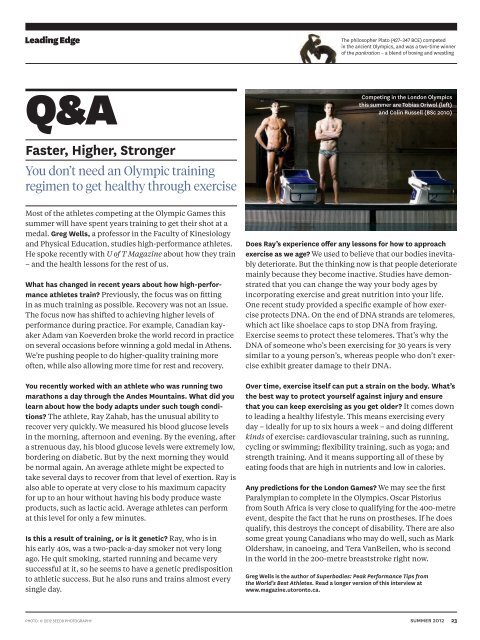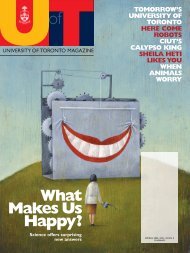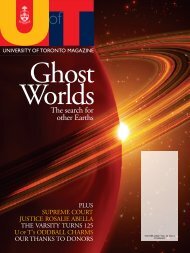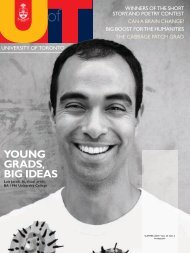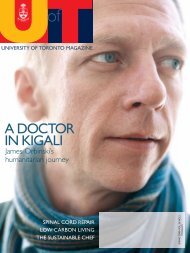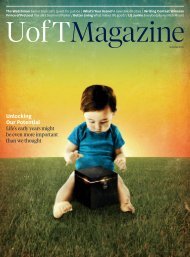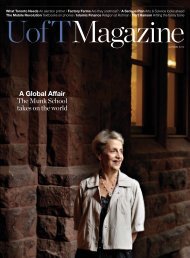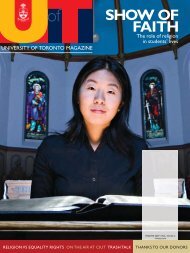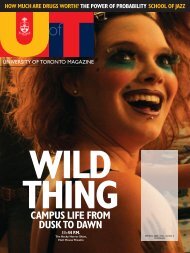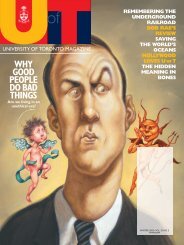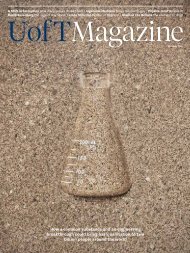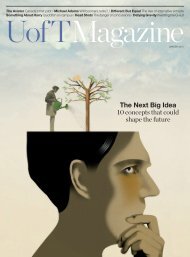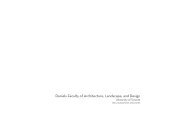What's the solution to Toronto's traffic problems? - University of ...
What's the solution to Toronto's traffic problems? - University of ...
What's the solution to Toronto's traffic problems? - University of ...
You also want an ePaper? Increase the reach of your titles
YUMPU automatically turns print PDFs into web optimized ePapers that Google loves.
Leading Edge<br />
The philosopher Pla<strong>to</strong> (427–347 BCE) competed<br />
in <strong>the</strong> ancient Olympics, and was a two-time winner<br />
<strong>of</strong> <strong>the</strong> pankration – a blend <strong>of</strong> boxing and wrestling<br />
Q&A<br />
Competing in <strong>the</strong> London Olympics<br />
this summer are Tobias Oriwol (left)<br />
and Colin Russell (BSc 2010)<br />
Faster, Higher, Stronger<br />
You don’t need an Olympic training<br />
regimen <strong>to</strong> get healthy through exercise<br />
Most <strong>of</strong> <strong>the</strong> athletes competing at <strong>the</strong> Olympic Games this<br />
summer will have spent years training <strong>to</strong> get <strong>the</strong>ir shot at a<br />
medal. Greg Wells, a pr<strong>of</strong>essor in <strong>the</strong> Faculty <strong>of</strong> Kinesiology<br />
and Physical Education, studies high-performance athletes.<br />
He spoke recently with U <strong>of</strong> T Magazine about how <strong>the</strong>y train<br />
– and <strong>the</strong> health lessons for <strong>the</strong> rest <strong>of</strong> us.<br />
What has changed in recent years about how high-performance<br />
athletes train Previously, <strong>the</strong> focus was on fitting<br />
in as much training as possible. Recovery was not an issue.<br />
The focus now has shifted <strong>to</strong> achieving higher levels <strong>of</strong><br />
performance during practice. For example, Canadian kayaker<br />
Adam van Koeverden broke <strong>the</strong> world record in practice<br />
on several occasions before winning a gold medal in A<strong>the</strong>ns.<br />
We’re pushing people <strong>to</strong> do higher-quality training more<br />
<strong>of</strong>ten, while also allowing more time for rest and recovery.<br />
You recently worked with an athlete who was running two<br />
marathons a day through <strong>the</strong> Andes Mountains. What did you<br />
learn about how <strong>the</strong> body adapts under such <strong>to</strong>ugh conditions<br />
The athlete, Ray Zahab, has <strong>the</strong> unusual ability <strong>to</strong><br />
recover very quickly. We measured his blood glucose levels<br />
in <strong>the</strong> morning, afternoon and evening. By <strong>the</strong> evening, after<br />
a strenuous day, his blood glucose levels were extremely low,<br />
bordering on diabetic. But by <strong>the</strong> next morning <strong>the</strong>y would<br />
be normal again. An average athlete might be expected <strong>to</strong><br />
take several days <strong>to</strong> recover from that level <strong>of</strong> exertion. Ray is<br />
also able <strong>to</strong> operate at very close <strong>to</strong> his maximum capacity<br />
for up <strong>to</strong> an hour without having his body produce waste<br />
products, such as lactic acid. Average athletes can perform<br />
at this level for only a few minutes.<br />
Is this a result <strong>of</strong> training, or is it genetic Ray, who is in<br />
his early 40s, was a two-pack-a-day smoker not very long<br />
ago. He quit smoking, started running and became very<br />
successful at it, so he seems <strong>to</strong> have a genetic predisposition<br />
<strong>to</strong> athletic success. But he also runs and trains almost every<br />
single day.<br />
Does Ray’s experience <strong>of</strong>fer any lessons for how <strong>to</strong> approach<br />
exercise as we age We used <strong>to</strong> believe that our bodies inevitably<br />
deteriorate. But <strong>the</strong> thinking now is that people deteriorate<br />
mainly because <strong>the</strong>y become inactive. Studies have demonstrated<br />
that you can change <strong>the</strong> way your body ages by<br />
incorporating exercise and great nutrition in<strong>to</strong> your life.<br />
One recent study provided a specific example <strong>of</strong> how exercise<br />
protects DNA. On <strong>the</strong> end <strong>of</strong> DNA strands are telomeres,<br />
which act like shoelace caps <strong>to</strong> s<strong>to</strong>p DNA from fraying.<br />
Exercise seems <strong>to</strong> protect <strong>the</strong>se telomeres. That’s why <strong>the</strong><br />
DNA <strong>of</strong> someone who’s been exercising for 30 years is very<br />
similar <strong>to</strong> a young person’s, whereas people who don’t exercise<br />
exhibit greater damage <strong>to</strong> <strong>the</strong>ir DNA.<br />
Over time, exercise itself can put a strain on <strong>the</strong> body. What’s<br />
<strong>the</strong> best way <strong>to</strong> protect yourself against injury and ensure<br />
that you can keep exercising as you get older It comes down<br />
<strong>to</strong> leading a healthy lifestyle. This means exercising every<br />
day – ideally for up <strong>to</strong> six hours a week – and doing different<br />
kinds <strong>of</strong> exercise: cardiovascular training, such as running,<br />
cycling or swimming; flexibility training, such as yoga; and<br />
strength training. And it means supporting all <strong>of</strong> <strong>the</strong>se by<br />
eating foods that are high in nutrients and low in calories.<br />
Any predictions for <strong>the</strong> London Games We may see <strong>the</strong> first<br />
Paralympian <strong>to</strong> complete in <strong>the</strong> Olympics. Oscar Pis<strong>to</strong>rius<br />
from South Africa is very close <strong>to</strong> qualifying for <strong>the</strong> 400-metre<br />
event, despite <strong>the</strong> fact that he runs on pros<strong>the</strong>ses. If he does<br />
qualify, this destroys <strong>the</strong> concept <strong>of</strong> disability. There are also<br />
some great young Canadians who may do well, such as Mark<br />
Oldershaw, in canoeing, and Tera VanBeilen, who is second<br />
in <strong>the</strong> world in <strong>the</strong> 200-metre breaststroke right now.<br />
Greg Wells is <strong>the</strong> author <strong>of</strong> Superbodies: Peak Performance Tips from<br />
<strong>the</strong> World’s Best Athletes. Read a longer version <strong>of</strong> this interview at<br />
www.magazine.u<strong>to</strong>ron<strong>to</strong>.ca.<br />
PHOTO: © 2012 SEED9 PHOTOGRAPHY<br />
summer 2012 23


